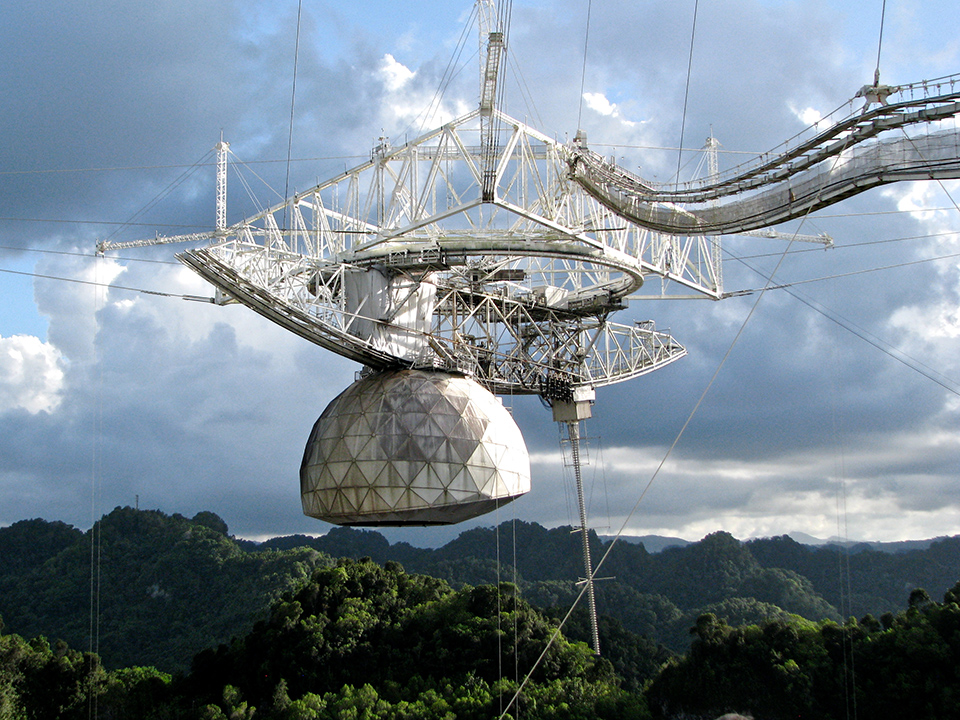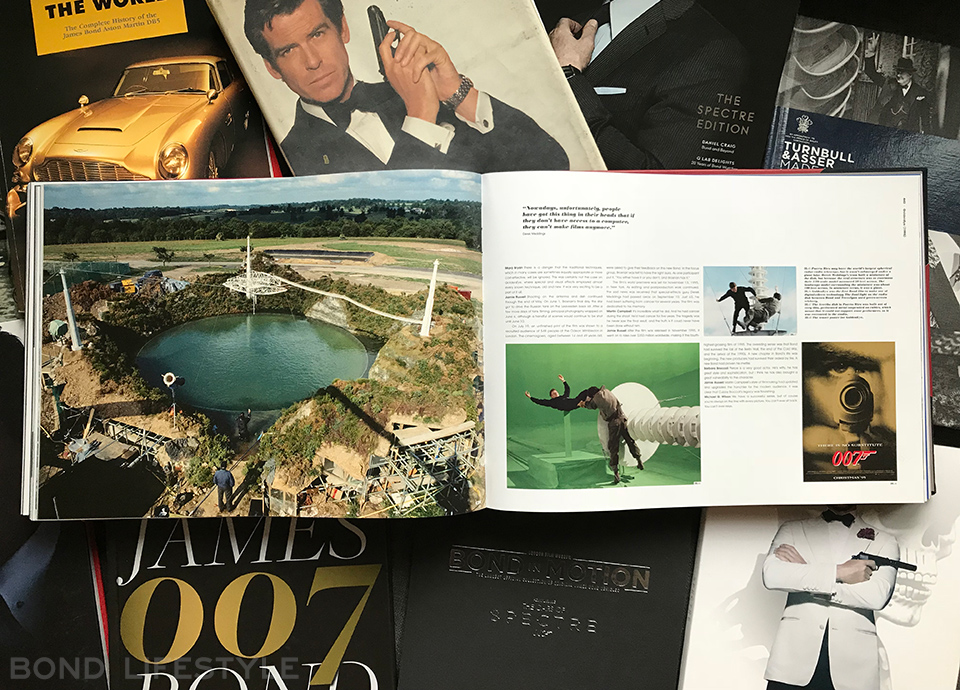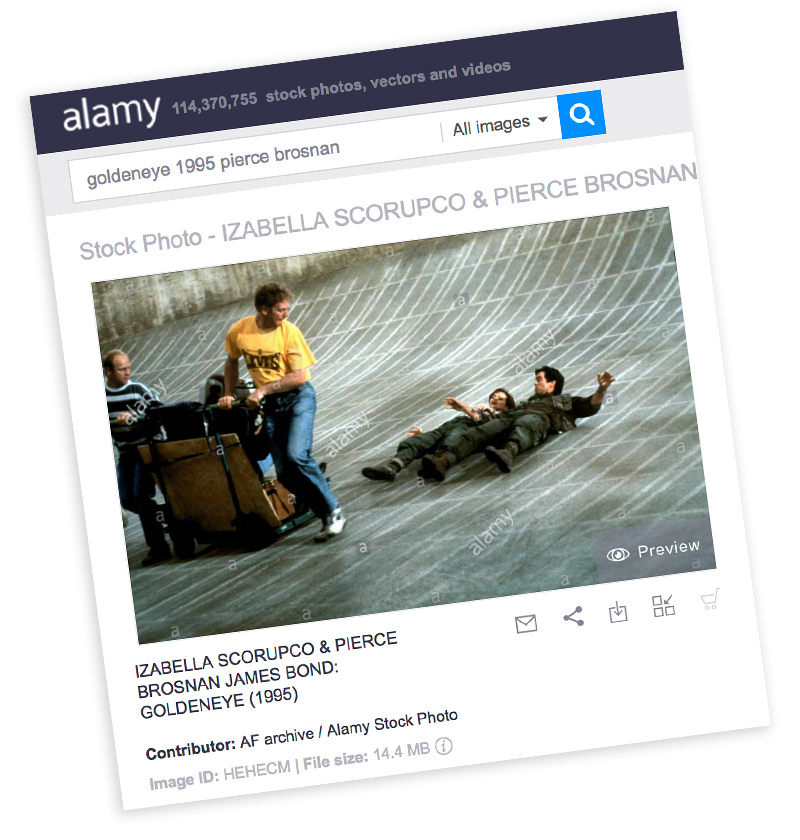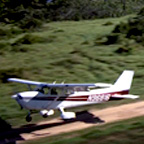Arecibo Observatory, Puerto Rico
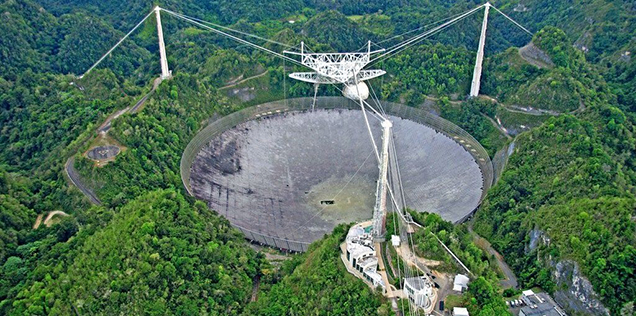
The Arecibo Observatory in Puerto Rico is one of the largest radio telescopes in the world. It features prominently in the last part of the 1995 movie GoldenEye.
The observatory was completed in 1963 and originally designed for national defence during the Cold War, when the U.S. wanted to use it to detect Soviet satellites, missiles and bombs. Later, the telescope became instrumental in the search for extraterrestrial intelligence (SETI) programs, asteroids that might head towards earth and other aspects of radio astronomy.
The 1,000-foot (305-meter) radio telescope was the largest single-aperture telescope until July 2016, when the Five hundred meter Aperture Spherical Telescope (FAST) in China was completed. The immense dish is constructed in a natural sinkhole in the ground.
In the film GoldenEye, the large dish is supposed to be in Cuba. James Bond (Pierce Brosnan) and Natalya Simonova (Izabella Scorupco) discover the dish, hidden in an artificial lake. It is Alec Trevelyan's satellite dish to control a second, secret GoldenEye satellite.
Many scenes of the film are not filmed at the dish site, but were filmed on the studio lot in May 1995 with visual effects and miniature models. GoldenEye was the first Bond film that used CGI (computer generated images). The hand-to-hand fight between Bond and Trevelyan on the antenna was filmed using a green-screen in the background, where later the dish was digitally added.
For many shots of the satellite dish, a huge 1:20 scale model of the dish and surrounding mountains was created. The 'miniature model' measured 50ft (15m) and the surrounding mountains 100ft (30m). For a great picture of the model, check the GoldenEye chapter in the TASCHEN James Bond Archives book.
The shots of Bond and Natalya sliding down the dish were filmed somewhere else, since the real dish is made of a metal mesh, not concrete. A behind-the-scenes photo of this can be found on Alamy, but an exact location is not mentioned.
In the end credits of the film, the producers "gratefully acknowledge the cooperation of [...] The Arecibo Observatory, a facility of the national science foundation" [...]. And Puerto Rico is mentioned as one of the filming locations, together with Monte Carlo, France, Russia, Switzerland. The studio shots were done at an old Rolls-Royce factory converted to a studio at Leavesden Aerodrome, a World War II airfield in Hertfordshire, England. Note that GoldenEye was the first film shot in those studios and it is one of the few films not filmed at Pinewood Studios.
The observatory also appears as a level in the 1997 Nintendo 64 video game GoldenEye 007 and the video game Just Cause 2. The observatory can also be spotted in the film Contact (1997), and Fox Mulder went to the observatory in The X-Files episode, "Little Green Men" (Season 2, Episode 1).
The observatory is a popular tourist attraction, with approx. 100,000 visitors a year, who are able to get a magnificent view of the large dish.
2014 Earthquake
The Arecibo Observatory was seriously damaged when an earthquake hit on January 13, 2014. During Hurricane Maria in September 2017, the radio telescope once again suffered damage during the storm. Officials have yet to conduct "a full assessment of the damage, repairs that are needed and when the observatory can resume observations," Nicholas White, senior vice president for science at the USRA, said in a statement. First reports say that the large hanging antenna, the one that James Bond and Alec Trevelyan climb down, has broken in half and fell down on the dish, damaging the dish..
2020: Collapse
Following two cable breaks supporting the receiver platform in the prior months, the NSF stated on November 19, 2020 that it was decommissioning the telescope due to safety concerns. On December 1, 2020 the main telescope collapsed before controlled demolition could be conducted.




